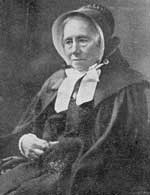Eliza Wigham. 1820-1898
 Eliza was at the forefront of all major campaigns to improve women’s rights in Britain in the 19th cent. Quaker women were active in William Wilberforce’s campaign to end slavery. The Quaker movement was founded in the 17th cent. One of its distinguishing features was the fact that women were allowed to stand and preach.
Eliza was at the forefront of all major campaigns to improve women’s rights in Britain in the 19th cent. Quaker women were active in William Wilberforce’s campaign to end slavery. The Quaker movement was founded in the 17th cent. One of its distinguishing features was the fact that women were allowed to stand and preach.
Not surprisingly, Quaker women spoke out loudly since their position was different to women in other organisations. They were able to speak and preach freely in public and hold (some) offices within the movement. It was not until 1896 that they enjoyed full equality with men. (Priscilla Bright McLaren's nieces complained about the separation of the movement with women not having the business power).
One of the reasons that the antislavery movement lost support after 1840 was because of the linking with other pressure groups such as the anti corn law league, Chartists and Temperance societies. Inevitably, perhaps, one person’s priority was not another’s. It says a lot for Eliza and Jane Smeal’s ability for compromise and pragmatism that the Edinburgh society kept going until 1870. (Unmatched by any other society). Ebb and flow of support was conditioned by events in America and novelty value of visiting personalities such as Harriet Beecher Stowe.
Added to this as Elizabeth Pease noted: "..there the wave of religious feeling which brought about the Disruption in 1843, was quickening the national conscience and predisposing the better part of the national conscience of such town as Glasgow and Edinburgh to a less lukewarm interest in matters affecting the larger community outside of Great Britain." Thus all attempts to build alliances with movements of social and political reform had failed and by the end of the 1840s the anti slavery cause and issue of women’s rights, which was part of the radical Garrison platform, was almost moribund.
Eliza was also active in the promotion of self help schemes for the working class, helped found the Penny Savings Bank, the Women’s Working Society and Dean Bank Home (which aimed to prevent destitute girls from falling into crime).
Eliza supported the North in the American Civil War, which conflicted with her pacifist views. Lincoln’s emancipation proclamation of 1863 assured the slaves of their freedom if the North won – this triggered the formation of Freedman Aid Societies. These carried on the work of the fugitive slave programme, which had been supported by the Birmingham and Edinburgh societies in 1850s.
Eliza grew increasingly concerned with women’s rights particularly the issue on ‘Social Purity’ – ie the Contagious Diseases Acts of 1864 and 1867. These Acts subjected suspected prostitutes to periodic medical examinations (not the punters!). Eliza along with others waged a war against these iniquitous laws, which were finally repealed in the 1880s. They galvanised a disparate range of women’s groups and personalities into collective action. Ten of the 33 leaders had been involved in anti-slavery action, 7 of the 10 were involved in the women’s suffrage movement, 4 in promoting women’s education and 2 in the campaign for a Married Women’s Property Act.
Eliza’s house became one of the nerve centres of these campaigns. She became secretary of the women’s suffrage society in Edinburgh Elizabeth Pease was its treasurer and Priscilla Bright McLaren became its president.
References:
William W J Knox: Lives of Scottish Women, Women and Scottish Society 1800-1980.
Picture: held in National Library of Scotland.
